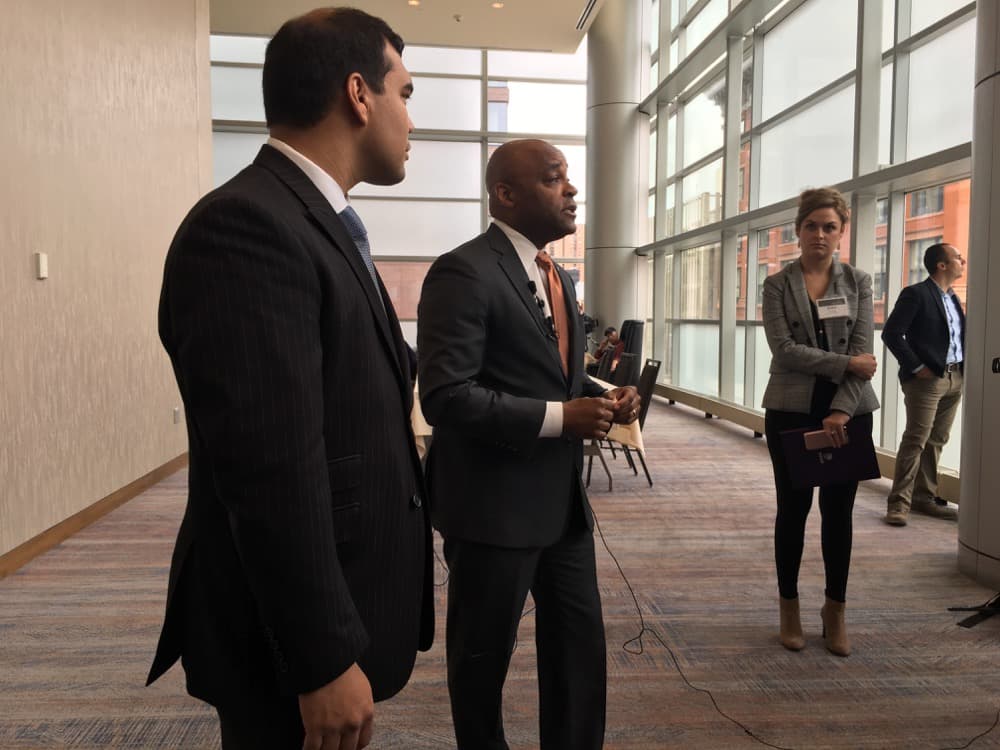
Denver's leadership outlined the future of its approach to homelessness and housing at a summit on Friday morning. The emphasis was a more-connected approach that tries not just to find people homes but to provide jobs training and health support, beginning today.
That effort will include a new foreclosure-prevention program, an expanded effort to deploy mental-health professionals alongside police and new resources for homeowners in gentrifying neighborhoods.
The city did not announce new funding for its affordability efforts, instead saying that the focus was on improved efficiency and collaboration with outside groups to deliver better housing, health and jobs.
"If we want to have a more efficient, more proficient, effective approach ... we have to broaden our reach — that is to bring down the silos that our departments have in the city of Denver," said Mayor Michael Hancock.
"We're moving beyond the housing-first approach," he said later, though he emphasized that housing remains crucial.
"The city of Denver is spending an inordinate amount of resources, but we were not coordinating — we were not singing with regards to one sound, one band," the mayor added later. "So, it's not about the money, it's about the approach."
To that extent, the city will pursue "30 short-term action initiatives in the next six months," said Erik Soliván, the city's new housing czar.
Specific strategies include:
- Expanding Denver Day Works, the homeless employment program
- Expanding Section 3, "so that our low- and very low-income families can find a good home and a good job," Soliván said
- The expansion of renter assistance initiatives, with the aim of preventing evictions
- "Evaluation and expansion of public restrooms, needle collection points and trash cans
- Expanding the program that helps people with utility bills
- Developing and expanding mental-health programs
The full list of 30 action items is available online.
"Today, we must solve for a housing market that has limited accessibility for all people — a market that has the most inventory for those with the highest incomes," Soliván said. "High-cost housing sits unused while voucher lists and wait lists and our shelter lines continue to grow."
The city, of course, has already committed $150 million to a plan that would build 6,000 affordable units over the next decade. The city has faced criticism that this only covers a fraction of the number of people who don't have housing or are spending too much. In response, Hancock cautioned that there was a limit to what new construction could do.
"The reality is that we cannot mislead ourselves to believe that we can build our way out of this challenge, and the city of Denver can not do it by itself," Hancock said.
"Though we sense the urgency ... we have to do it within our capacity to address it without overwhelming our citizens and our taxpayers."
City staff also argue that their new approach will help people move up the socioeconomic spectrum and into those vacant and more-expensive units, arguably freeing up more of the cheaper units. Hancock said that the city can also multiply the effect of its spending by attracting and leading other partners, and he believes that the number of units built will be much greater than 6,000.
"I think, collectively, we're going to do much better than that," he said. " ... I think what you're going to see the city do is take the resources we're already allocating and do much more with it."
He particularly promised a reduction of waste and greater efficiency in mobility, bettering people's ability to get around the city.
Hancock said that Soliván's research had found an increasing number of seniors and millennials in need of affordable housing, and that three-quarters of shelter users are working.












